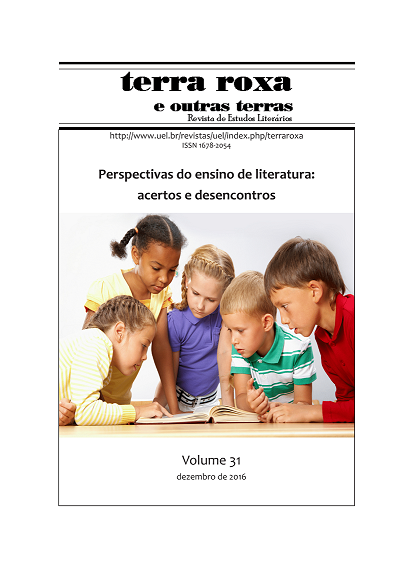Subjetivity and reader formation: the problems of the absence of literary reading in student books at first grades of elementary school
DOI:
https://doi.org/10.5433/1678-2054.2016v31p18Keywords:
Reading, Subjetivity, Literature, Student bookAbstract
The reader formation requires subjectified processes. The significant reading only becomes effective when it allows the reader to act through their subjectivity. The literarie texts need to be present since the first grades of elementary school. This is essential because it is a privileged space to the subjective displacement thanks to the appropriation of prestigious literacy. However the most scholar actions seem to disregard the link between subjectivity and significant reading, consequently, to disregard the importance of literary reading in the school. This reading conception leads to applications of comprehension activities which do not implicate the children in the formative potencial of the reading. Such activities submit the subject to a condition of unsubstantial readers, bounding them to discursive positions built along the history. These conclusions result from a research that focus on the reading propositions disseminated by maternal-language student books throughout the first grades of elementary education. This article alerts to the necessity of reviewing the fundaments of the approach to the formation of the reader, especially at the inaugural moments of his/her journey.Downloads
References
CANDIDO, Antonio. Vários escritos. São Paulo: Duas Cidades, 1995.
COLOMER, Teresa. Andar entre livros: a leitura literária na escola. Tradução de Laura Sandroni. São Paulo: Global, 2007.
ELIAS, José. Um jeito bom de brincar. São Paulo: FTD, 2002.
FINK, Bruce. O sujeito lacaniano: entre a linguagem e o gozo. Tradução de Maria de Lourdes Sette Câmara. Rio de Janeiro: Zahar, 1998.
FREUD, Sigmund. Além do princípio do prazer. Tradução de Christiano Monteiro Oiticica. Rio de Janeiro: Imago, 2003.
GERALDI, João Wanderley. A aula como acontecimento. A aula como acontecimento. São Carlos: Pedro e João Editores, 2015, p. 81-101.
INDURSKY, Freda. Estudos da linguagem: a leitura sob diferentes olhares teóricos. In: L. V. Founi, (org). Letramento, escrita e leitura. Campinas: Mercado de Letras, 2010, p. 163-178.
JOUVE, Vincent. A leitura. Tradução de Brigitte Hervot. São Paulo: Unesp, 2002.
KATO, Mary. O aprendizado da leitura. São Paulo: Martins Fontes, 1995.
KLEIMAN, Angela. Oficina de leitura: teoria e prática. Campinas: Pontes, 2008.
SMITH, Frank. Leitura significativa. Tradução de Beatriz Affonso Neves. Porto Alegre: Artes Médicas, 1999.
SOLÉ, Isabel. Estratégias de leitura. Porto Alegre: Artmed, 1998.
Downloads
Published
How to Cite
Issue
Section
License
Authors who publish in this journal agree to the following terms:
a) The authors retain the copyright and grant the journal the right of first publication, the work being simultaneously licensed under the Creative Commons Attribution-NonCommercial 4.0 International License, allowing the sharing of the work with acknowledgment of the authorship of the work and initial publication in this journal.
b) Authors are authorized to assume additional contracts separately, for non-exclusive distribution of the version of the work published in this journal (eg, publish in an institutional repository or as a book chapter), with acknowledgment of authorship and initial publication in this journal.
c) Authors are allowed and encouraged to publish and distribute their work online (e.g. in institutional repositories or on their personal page) after the editorial process, as this can generate productive changes as well as increase impact and citation of the published work (See The Effect of Open Access).
d) The authors of the approved works authorize the journal to, after publication, transfer their content for reproduction in content indexers, virtual libraries and the like.
e) The authors assume that the texts submitted for publication are of their original creation, taking full responsibility for their content in case of any objection by third parties.



















